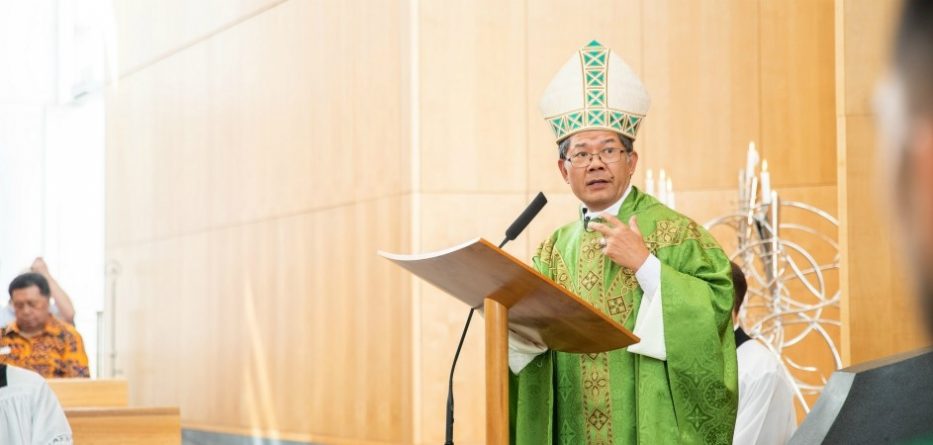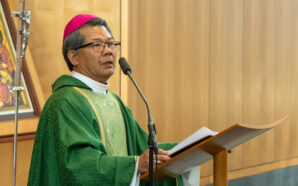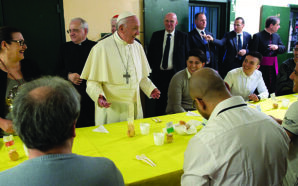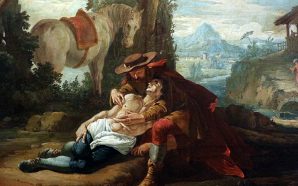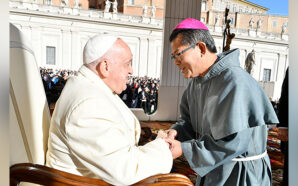Most Reverend Vincent Long Van Nguyen OFM Conv DD STL, Bishop of Parramatta
Homily for the 30th Sunday in Ordinary Time Year C 2019 at St Patrick’s Cathedral, Parramatta
Readings: Eccle 35:12-19; 2Tim 4:6-18; Luke 18:9-14
31 October 2019
Empathy and compassion versus self-occupation
Dear friends,
The Synod of Bishops on the Amazon in Rome took a rather unpleasant turn last week. Some Catholics were upset at the display of the wooden statues in the Vatican Garden. Instead of showing respect for these traditional symbols of the Indigenous peoples, they seized them and cast them into the river Tiber.
The Pope himself apologised for these acts of disrespect and intolerance. He also commented on the criticism of native people wearing hats made out of feathers during the opening ceremony, saying that they were no less ridiculous than other hats worn at the Vatican.
These incidents might seem minor in the scheme of things. However, what they did show was the neo-colonial and superior mentality that is at the root of the destruction of the Amazon and its native peoples. For centuries, it gave license for dominant Western nations to conquer, subjugate and even annihilate tribal populations.
We might not be guilty of intolerance and disrespect for other cultures, including their food, clothing, music, spiritual symbols et cetera. But there is also the mentality that inclines us to be judgmental of those less fortunate than we are and blame them for their predicaments and failures.
The Word of God today exposes such a mentality as fundamentally self-serving and delusional.
Jesus tells the parable of the Pharisee and the Tax Collector in a way that cuts through layers of human prejudices. The Pharisee is often held up as an example of moral uprightness. Yet through the prism of Jesus, he is seen as self-serving and delusional.
The Pharisee is the person with the ultimate sense of entitlement. He attributes his moral superiority to himself: “I thank you, God, that I am not grasping, unjust, adulterous like the rest of mankind”. He is totally blind to his self-made and self-earned illusion. As a result, he is unable to see that there is a shared humanity between him and the tax collector. He puts himself above the latter: “I am not like this tax collector here”.
As far as Jesus is concerned, it is not self-made righteousness but empathy and compassion that truly matter. The Pharisee fails the litmus test of authentic discipleship because of his lack of empathy and compassion. The tax collector, on the other hand, is praised because free from any sense of entitlement, he is totally open to the gratuity of God’s grace.
This is the Gospel message with a sharp edge.
It disarms us because it takes away the security that we rely on in terms of who we are, what we have and the sense of worth that is linked with our successes and achievements. The parable of Jesus says that the Pharisee is not more valued than the tax collector because of the badge of honour he wears, the status he has or the social prestige he is entitled to.
It challenges the notion that we deserve more than others because of what we have inherited or earned: our talents, gifts, contributions or our race, religion and other accidents of birth.
Jesus consistently tells us that God does not see things the way we see nor judge people the way we judge. The Parable of the Rich Man and Lazarus, the Good Samaritan or the Eleventh Hour Worker convey this same message: God looks upon the humble who recognise the gratuity of his love, rather than the proud who boasts about his own record of achievements.
Brothers and sisters,
The Word of God thus challenges us about our relationship with God and with one another. If God refuses the proud and hears the cry of the humble poor, or as the Book of Ecclesiasticus says he does not ignore the orphan and widow, then we must have a heart sensitive to the suffering of others.
We cannot be the disciples of Jesus and think and act merely in terms of what we are entitled to by virtue of our birthright or conquest. None of us could be saved if God applied the strict justice on the basis of our merits and failings. The parable challenges us to think and act in the way that God in Jesus has shown us, which is based on the justice of the Kingdom and the very mercy of God.
Today, we join with these couples in giving thanks to God for the gift of marriage, which they have shared with each other and their loved ones.
They have sought to emulate the self-sacrificial love of Christ and I am sure they have realised how that effort often runs up against their human limitations. Today is the day to give thanks and to renew our commitment to live with the heart and the pathos of God. Whatever path we walk in our journey of giving and receiving love, we are not meant to be alone. We need community, and it is here that the Church has a key role, in supporting us as we strive to build love and in supporting us when our efforts collapse about us.
May we learn to be a humble, loving people who support one another to live the Good News of Jesus. May we learn to free ourselves from narrow vision of self-interest in order to practice an integral ethic of concern and care for all of God’s people and creation, to be a community of empathy, compassion and inclusion.




